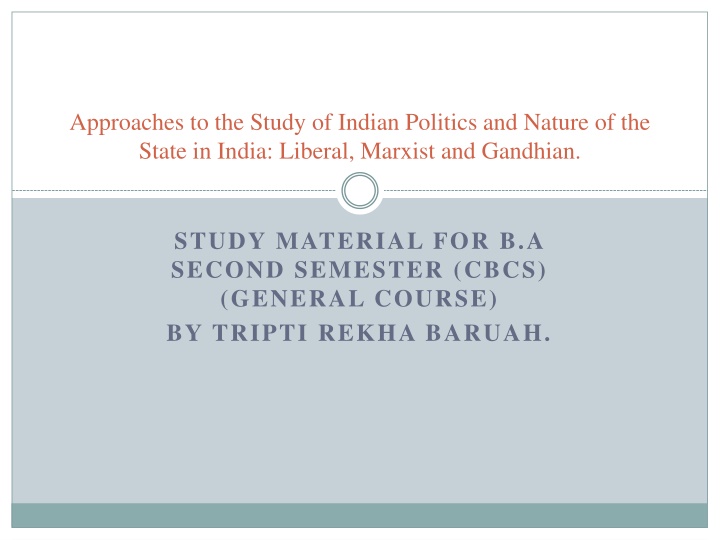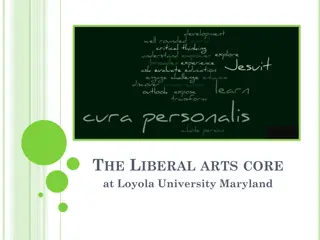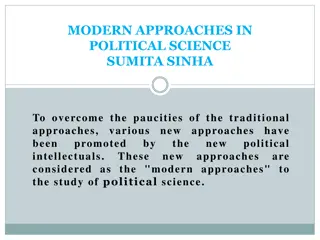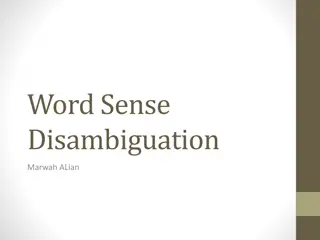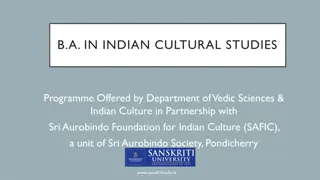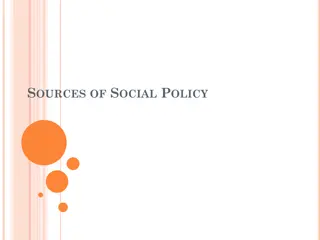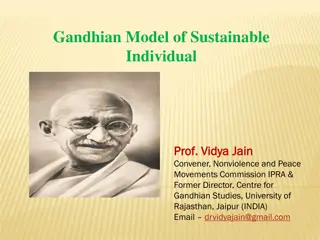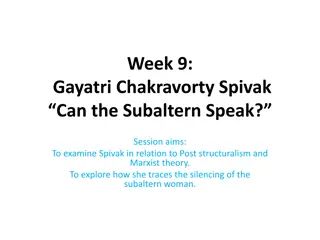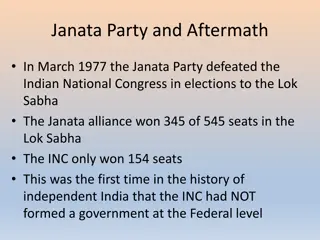Approaches to Study of Indian Politics: Liberal, Marxist, and Gandhian Perspectives
Political Science encompasses various approaches such as Liberal, Marxist, and Gandhian for studying Indian politics. Scholars have explored the nature of the Indian state post-independence, focusing on democratization, social heterogeneity, and class dynamics. The Marxist approach views the state as an organ of class oppression, rooted in dialectical materialism and historical materialism. Understanding these diverse perspectives is crucial in analyzing the complexities of Indian politics.
Download Presentation

Please find below an Image/Link to download the presentation.
The content on the website is provided AS IS for your information and personal use only. It may not be sold, licensed, or shared on other websites without obtaining consent from the author.If you encounter any issues during the download, it is possible that the publisher has removed the file from their server.
You are allowed to download the files provided on this website for personal or commercial use, subject to the condition that they are used lawfully. All files are the property of their respective owners.
The content on the website is provided AS IS for your information and personal use only. It may not be sold, licensed, or shared on other websites without obtaining consent from the author.
E N D
Presentation Transcript
Approaches to the Study of Indian Politics and Nature of the State in India: Liberal, Marxist and Gandhian. STUDY MATERIAL FOR B.A SECOND SEMESTER (CBCS) (GENERAL COURSE) BY TRIPTI REKHA BARUAH.
Political Science is a Social Science and it is a Progressive science. There are different methods and approaches for studying the subject. Different methods and Approaches are used by the political scientists to cope up with different changes in human nature and institutions. A method is a technique but an Approach is a broad view or attitude which is adopted in studying the subject. It is a way of looking at and then explaining a particular phenomena. Indian Politics is a part of Political Science and different approaches are used by scholars of the subject. India's independence was a great historical event and a political phenomenon which turned out to be a baseline for reshaping the political future of India. Independence of India became a baseline for forming a self-government based on the principles of democracy, adult franchise, secularism and egalitarianism and its most important consequence was the democratization of Indian society and polity. Over a period of more than seventy years since independence a number of Political Scientists, Historians ,Sociologists, Economists and anthropologists conducted studies with different perspectives or approaches concerning the nature of Indian State.
Politics is an unavoidable universal activity. It is the activity through which people make, preserve and amend the general rules under which they live. It is a continuous, ever-changing and universal activity. Study of the Indian Politics is a crucial and complex one, it is crucial in the sense that Indian Politics emerge from various social heterogeneity. Indian politics is very interesting to study by applying different approaches. Thus different approaches are adopted by scholars of the subject. Liberal,Marxist and Gandhian are the three principal perspective or approaches adopted by the scholars. Marxist Approach At the very beginning it will be desirable to mention the main points of the Marxian theory of state . Marx made it clear in his early writings that the state is an organized power of one class oppressing the other i.e. the economically dominant minority class through political dominance rules over the majority working class. Marx regarded the state as an alienated and parasitical social force and never regarded the state as a higher moral institution which can end conflicts in society and bring unity and harmony. The state to him was neither equal to society nor above it, but was merely its product at a certain stage of historical development.
Marx believes in a general theoretical framework known as Dialectical Materialism and in the materialistic interpretation of history. Dialectical Materialism is the process on the basis of which development of the society took place, which is termed as HistoricalMaterialism or the materialistic interpretation of history. Marxists hold that all phenomena that we experience in our lives are material, concrete and objective whether consciously or un consciously . All the phenomena are characterised by internal contradictions, leading to conflicts and then, eventually rising to a higher level of development. This whole process is termed by Marx as dialectical materialism. Therefore, to understand any phenomenon, one must grasp the way it changes. A capitalist society is one that is based on the capitalist mode of production, where the capitalists (a minority class) own the means of production and the motive of production is profit and the workers (a majority class) sell their labour power to the capitalists for wages. In such a society politics, culture, morality and social norms are determined by the capitalist mode of production and the society is sharply divided into capitalists and workers. As the interests of these two classes are opposed to each other, class struggle between them is fundamental. The western liberal democracies- the USA, England, France, West Germany, Italy, etc. are examples of such societies. For the abolition of classes, Marx gives the theory of revolution, which is the most important aspect of the Marxian theory of state.
The task of Marxian philosophy is two-fold, one is to understand the world and the other is to change it. Marxism does not suggest reforms of the exploitative capitalist system, but suggests that it should be over-thrown by a violent revolution and as a result a socialist state and economy will be established. This socialist state will be a temporary phenomenon; it will abolish private property and classes; and thereafter, it will wither away. Thus, the Marxian theory of state does not glorify the state; rather it is a theory of its overthrow, its withering away, and to establish a classless society. According to this theory, politics and state are parts of the superstructure which is based on the economic system or the mode of production of a given society. Marxian theory of the origin of state is also based on this general view of state and politics. Thus according to this theory state originated with the division of society into classes and with the beginning of the struggle between classes. The historical analysis of the origin of state is that the state is a product of society at a certain stage of development . The state has, thus, originated with the birth of classes and class struggle in society and is merely an instrument of exploitation in the hands of a dominant class. With the help of the state, ruling classes maintain their power over economically poor classes.
Marxist Approach and Indian Scholars: Though many scholars has analysed Indian Political System by adopting Marxian Approach but M.N. Roy(Manabendra Nath Roy ) and R. Palme Dutt (Rajni Palme Dutt)were the first Indian scholars who attempted a Marxist analysis of Indian politics. Both the philosophers tried to relate the political structure and movements to the structures at the economic level. They considered political process as a part of dynamic totality. They never considered Politics as a totally autonomous process involving only political ideology , political institutions and important political personalities. Their view was that there is a close relationship between the economic and the political process of a country. According to R.P.Dutt imperialism disturbed the normal process of transition from feudalism to capitalism in India. Imperialism retarded economic development and complicated the process of transition. This process has also been also described as de-industrialization by some other writers. Both of them preferred the application of the Marxist method to Indian politics. Later on Nehru, J. P. Narain and Narendra Dev adopted a modified Marxist analysis to understand the course Indian History and Politics.
We have to note it that political analysis from the Marxist point of view is clustered around three Important ideas class contradiction, exploitation by the bourgeoisie and inevitability of revolution. These three ideas provide a radically different understanding of the class character of the Indian state, of the bourgeoisie and of the possibilities of politics. Marxism in social science studies has been used exactly as the Marxist frame. The word 'Marxist' was unknown in Marx's own time. Once Marx said- "All I know is that I am not a Marxist". Marxism is a whole worldview, comprehensive theory of evolution embracing both nature and human society. Marx himself conceived his theoretical work primarily as a critique of political economy from the standpoint of the revolutionary proletariat, and as a materialist conception of history. This conception was developed in conscious opposition to the subjective- idealist standpoint. As such Marx shows that the state and property are a reflection of real conditions. Some of these Marxist conceptions are being challenged and revised by non-dogmatic Marxists .
Marxism and the Study of Indian Polity : In the early years of post-independence period a macro structural analysis of Indian society in general and of Indian politics in particular was taken up by Charles Bettelheim (a French Marxian Economist)using the orthodox Marxist framework with the help of concepts such as bourgeoisie, petty bourgeoisie, proletariat, economic base and superstructure, public and private sector, surplus value etc. With regard to relation between state power and people two main points are highlighted by Bettelheim. Firstly, the state is an instrument of repression and bureaucratic control, the form of repression and control depends on class tensions, the level of development of productive forces, the standard of education, and the social conscience of different classes. The state bureaucracy and its employees also affect the functioning of the state. Since the Indian state inherited colonial legacy, it essentially remained repressive, bureaucratic, and democratic. Secondly, after Independence the state organisations were not remodelled by the new government. In stead there were some minor reforms and that could not negate the colonial legacy. Hence, there is a tendency to imitate traditional forms of self-government. He also criticised the functioning of India's political parties as they adopted a more or less European system of party model.
In India there are ideological differences among the political parties, Such ideological differences hides the peculiar character of Indian political life. It conceals many feudal and semi-feudal economic and social relationships. The political parties in India must tackle the problems of state, economic control, and the agrarian problems. Again it may be added that in the recent past the political scene in India has changed a lot . Many of the premises and conclusions given by different analyst who adopted Marxist Approach in analysing Indian Politics need to be reformulated in the light of emergence of Coalition Government , recent emergence of BJP as a single majority Party in the Parliament ,vastly varying permutations(arrangement) etc. Recent changes in India's political economy negate their hypothesis about the state capitalism and centralization of economic power and political power in the hands of few. Liberalization of the economy has not only changed the nature and meaning of India's five year plans( principal feature of Socialist Economy), it has also changed considerably the character of Indian state and ideological basis of Indian politics. regional politics and political
Public sector which is another feature of Socialist Economy has become extremely weak and multinationals are substituting them. Trade unionism has become somewhat weak. Private sector is no more a polluting arena of employment. A revivalist politics has also prospered along with liberalization of economy and weakening of the state. Thus, Marxian explanation seeks a search for dialectical knowledge about politics. Marx looks at politics or the political system , within the objective conditions structurally constituted by the prevalent mode of production at particular junction in the history of a society. However, Marx's treatment of politics remained largely un theorized by him. Thus, according to Marxian perspective, there is nonrelative autonomy of politics. However, there is a relative autonomy of the State in a particular historical situation. But the state is not autonomous from the socio-economic structure of a class-divided society which it essentially serves, and mentions that state always remains the organiser of society in the interest of the class structure as a whole.
For Marx politics has primacy over other institutions of the society as Marx was a revolutionary. Marx knew very well that in the absence of revolutionary politics the structural base of society could not be changed, and he also professed that all politics will remain super structural in its essential character and outcome. This is the base of a determined and determining choice in politics within which other more or less choices occur. This is the dialectics of the economy and politics in the social science of Karl Marx. Thus, in Marxism the revolution is the main centre of politics . The political as a whole is in the realm of the contingent( dependent on some happenings), or historical conjunctures (combination of events )and in the changing balance of social forces. The political' is a realm of real choices and possibilities, and hence it is devoid of certainties and predictabilities. Marxism and the Indian State: A number of studies of power-politics and political parties in relation to the Indian state and class structure have come up in the post-independence period for an exposition of the Marxian perspective to the understanding of politics in India. Most of these studies show the bias of the Indian society. The nature of the state is such that its democratic institutions motivate the downtrodden to extend their support to a government which cannot bring about their emancipation from poverty and de- humanization.
The bourgeoisie(Capitalist) political parties are supported by the lowest sections of Indian society, and this is an irony and contradiction of the Indian political system. Contradictory coexistence of democracy and capitalism clearly comes out when one looks at the Indian political situation today. The phenomenon of political transformation has been analysed in the various essays in terms of the social and cultural divisions that have surfaced and the elasticity of the Indian political system to overcome fragmentation and to achieve common political and economic goals .It clearly highlight the divergence between the political discourse of the ruling power elite and that of the mass of the population opposed to them. Several political movements took place in different parts of India which were against the increasing hegemony of the Indian state and the Congress Party. The coercive character of the Indian state in particular is the main theme of many of those essays. Most of the studies highlight on the intensification of political contradictions and conflicts particularly in the post-emergency period. It is argued that the so-called mainstream political science was concerned with the formal structures and the prescribed ways and traditional social categories.
The mainstream Indian political scientist (with exception to Rajni Kothari) discussed Indian Political System using western political science and comparative politics and development studies. The mainstream political science has failed to recognise the on-going dialectics between contradictory social and economic forces underlying political phenomenon, and somewhere there was a general unwillingness to demarcate the dialectical method in the study of rigid orthodoxies of the fractured Indian communist movement. Thus one can emphasise on the study of political processes, political actions and aims in everyday life relating them to institutional structures of the state and society. Such an analysis will help to understand the continuing relationship between changing terms of political discourse and the changing agenda of politics in the concrete. At last we can conclude that as according to Marxism revolution is the main instrument through which social changes occur , it is particularly true in case of India because the movement for independence of India is one of the biggest mass movements in the history of the world. It saw the participation of wide sections of people under the leadership of Indian National Congress. The revolt of 1857 was the first collective movement which was given a mass appeal and national character under the leadership of M.K.Gandhi and it resulted in the emergence of Independent India.
